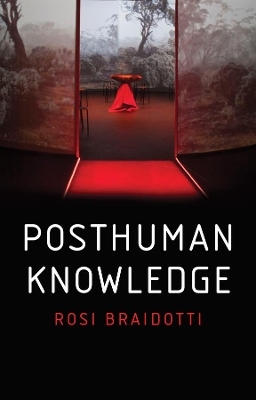
Posthuman Knowledge
Seiten
2019
Polity Press (Verlag)
978-1-5095-3525-5 (ISBN)
Polity Press (Verlag)
978-1-5095-3525-5 (ISBN)
- Titel z.Zt. nicht lieferbar
- Versandkostenfrei
- Auch auf Rechnung
- Artikel merken
The question of what defines the human, and of what is human about the humanities, have been shaken up by the radical critiques of humanism and the displacement of anthropomorphism that have gained currency in recent years, propelled in part by rapid advances in our knowledge of living systems and of their genetic and algorithmic codes coupled with the global expansion of a knowledge-intensive capitalism.
In Posthuman Knowledge, Rosi Braidotti takes a closer look at the impact of these developments on three major areas: the constitution of our subjectivity, the general production of knowledge and the practice of the academic humanities. Drawing on feminist, postcolonial and anti-racist theory, she argues that the human was never a neutral category but one always linked to power and privilege. Hence we must move beyond the old dualities in which Man defined himself, beyond the sexualized and racialized others that were excluded from humanity. Posthuman knowledge, as Braidotti understands it, is not so much an alternative form of knowledge as a critical call: a call to build a multi-layered and multi-directional project that displaces anthropocentrism while pursuing the analysis of the discriminatory and violent aspects of human activity and interaction wherever they occur.
Situated between the exhilaration of scientific and technological advances on the one hand and the threat of climate change devastation on the other, the posthuman convergence encourages us to think hard and creatively about what we are in the process of becoming.
In Posthuman Knowledge, Rosi Braidotti takes a closer look at the impact of these developments on three major areas: the constitution of our subjectivity, the general production of knowledge and the practice of the academic humanities. Drawing on feminist, postcolonial and anti-racist theory, she argues that the human was never a neutral category but one always linked to power and privilege. Hence we must move beyond the old dualities in which Man defined himself, beyond the sexualized and racialized others that were excluded from humanity. Posthuman knowledge, as Braidotti understands it, is not so much an alternative form of knowledge as a critical call: a call to build a multi-layered and multi-directional project that displaces anthropocentrism while pursuing the analysis of the discriminatory and violent aspects of human activity and interaction wherever they occur.
Situated between the exhilaration of scientific and technological advances on the one hand and the threat of climate change devastation on the other, the posthuman convergence encourages us to think hard and creatively about what we are in the process of becoming.
Rosi Braidotti is a Distinguished University Professor at Utrecht University and founding Director of the Centre for the Humanities.
Acknowledgments
Introduction Posthuman, all-too-human
Chapter 1 The Posthuman Condition
Chapter 2 Posthuman Subjects
Chapter 3 Posthuman Knowledge Production
Chapter 4 The Critical Posthumanities
Chapter 5 How To Do Posthuman Thinking
Chapter 6 On Affirmative Ethics
Chapter 7 The Inexhaustible
Notes
Bibliography
| Erscheinungsdatum | 19.08.2019 |
|---|---|
| Verlagsort | Oxford |
| Sprache | englisch |
| Maße | 142 x 221 mm |
| Gewicht | 408 g |
| Themenwelt | Geisteswissenschaften ► Philosophie ► Erkenntnistheorie / Wissenschaftstheorie |
| ISBN-10 | 1-5095-3525-X / 150953525X |
| ISBN-13 | 978-1-5095-3525-5 / 9781509535255 |
| Zustand | Neuware |
| Haben Sie eine Frage zum Produkt? |
Mehr entdecken
aus dem Bereich
aus dem Bereich
die Grundlegung der modernen Philosophie
Buch | Softcover (2023)
C.H.Beck (Verlag)
CHF 25,20
Buch | Softcover (2023)
Reclam, Philipp (Verlag)
CHF 9,80

![Was heißt Denken?. Vorlesung Wintersemester 1951/52. [Was bedeutet das alles?] - Martin Heidegger](/media/113619842)
